Unit 6 Lesson 28 How Do I Learn English 课件(共43张PPT)2022-2023学年冀教版英语七年级下册
文档属性
| 名称 | Unit 6 Lesson 28 How Do I Learn English 课件(共43张PPT)2022-2023学年冀教版英语七年级下册 | 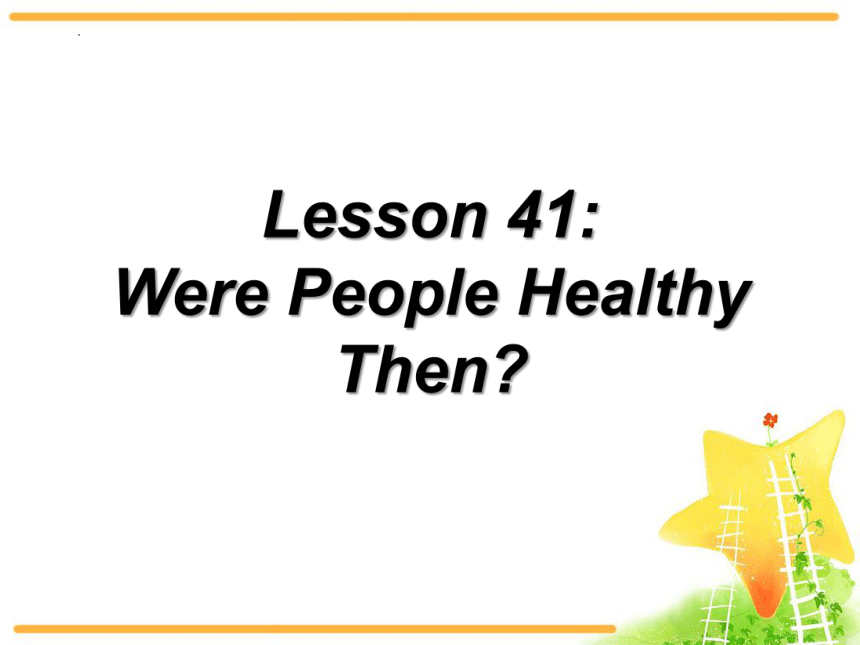 | |
| 格式 | zip | ||
| 文件大小 | 1.5MB | ||
| 资源类型 | 教案 | ||
| 版本资源 | 冀教版 | ||
| 科目 | 英语 | ||
| 更新时间 | 2023-05-05 17:45:17 | ||
图片预览

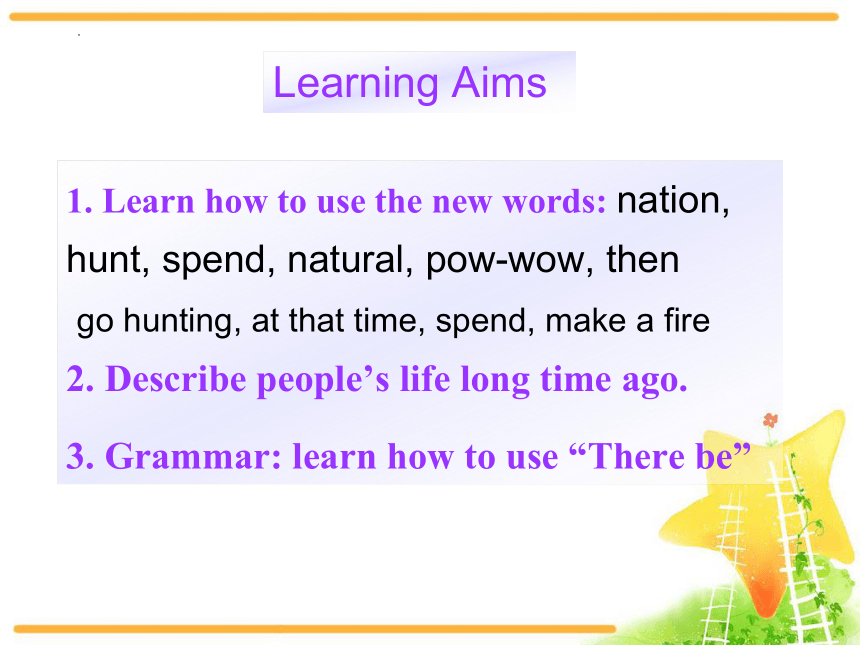


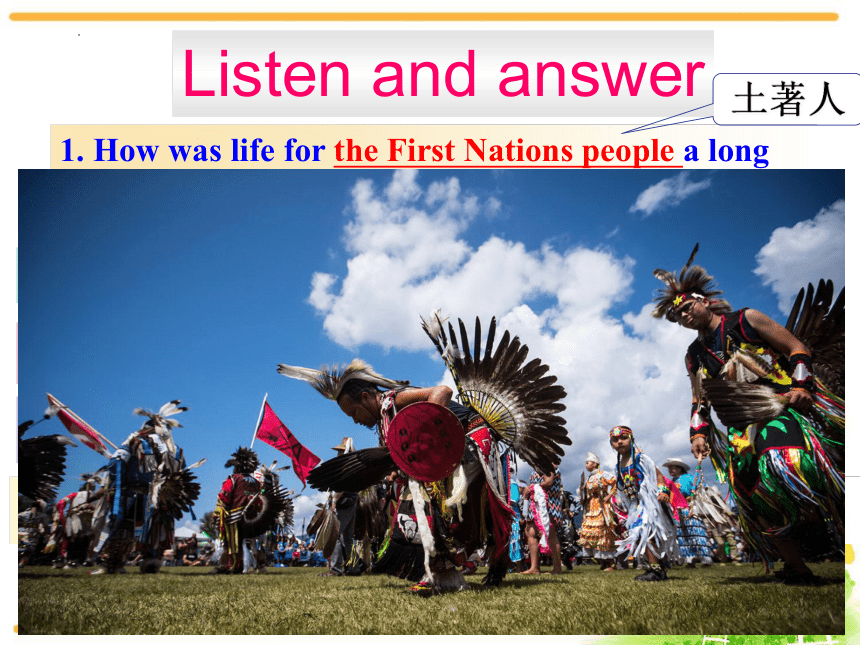
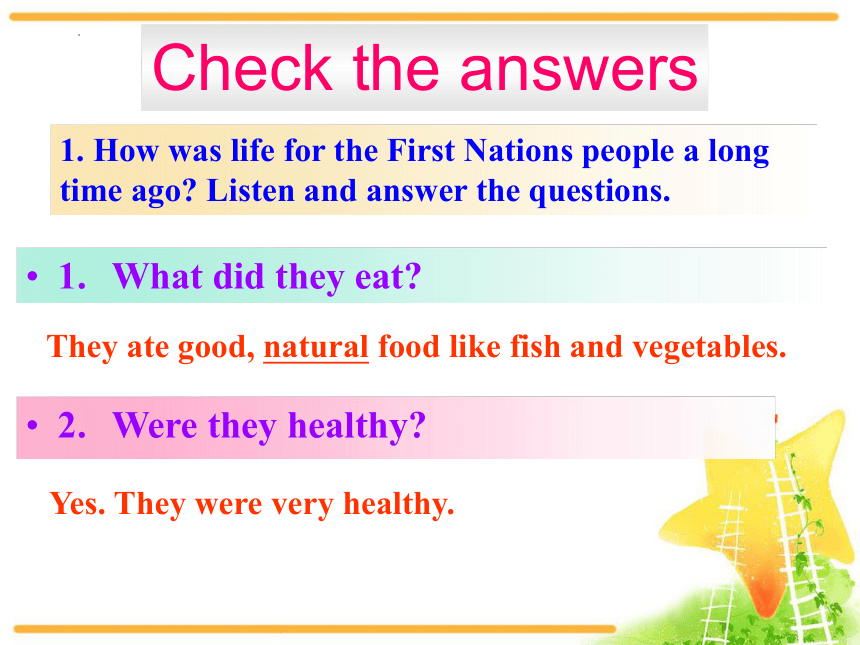

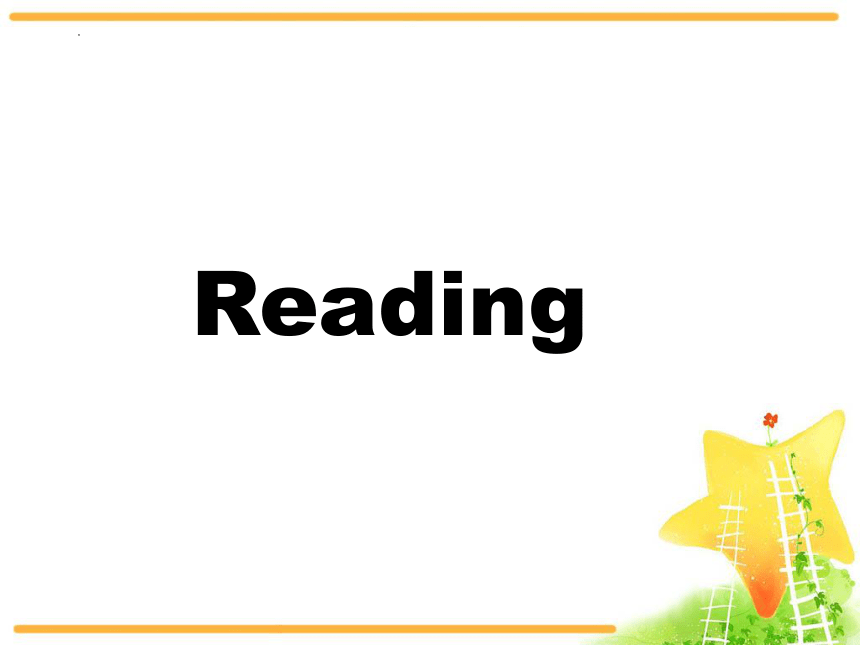

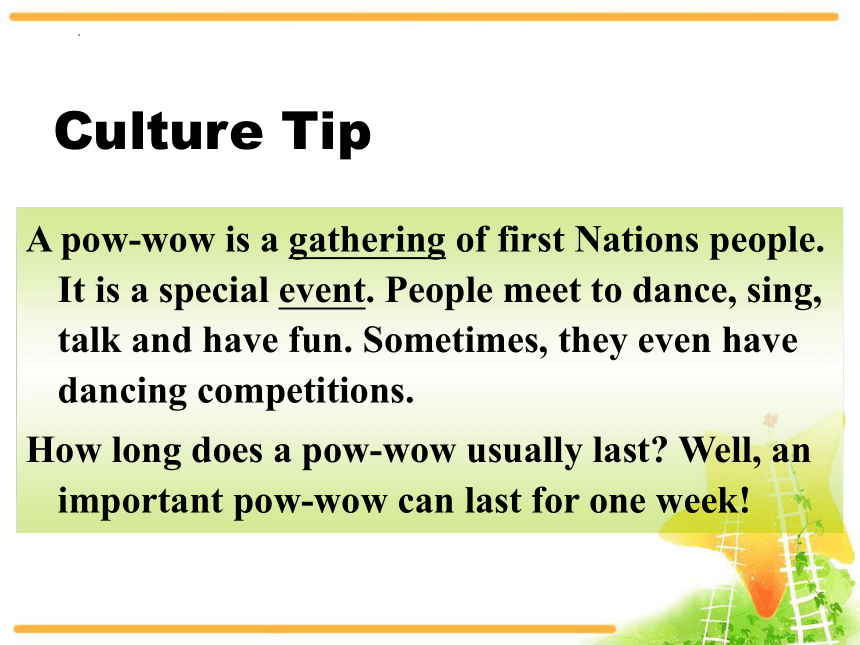
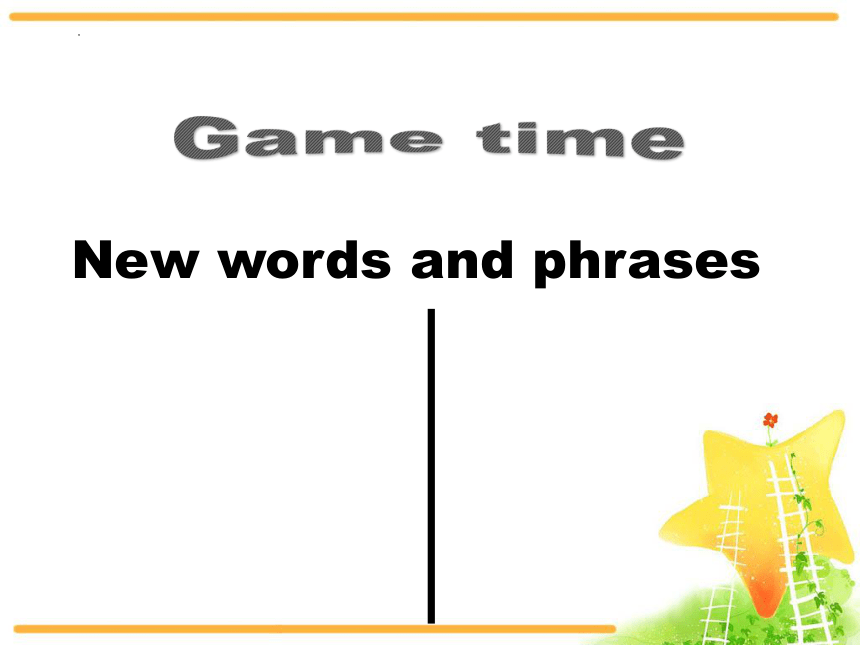

文档简介
(共43张PPT)
Lesson 41:
Were People Healthy Then
Learning Aims
1. Learn how to use the new words: nation, hunt, spend, natural, pow-wow, then
go hunting, at that time, spend, make a fire
2. Describe people’s life long time ago.
3. Grammar: learn how to use “There be”
Now and then
How did people get food a long time ago?
How about today
Was is easy for people to get food then
How about today
Listening
Listen and answer
1. How was life for the First Nations people a long time ago Listen and answer the questions.
1. What did they eat
2. Were they healthy
3. Did they go fishing
4. What did they do after work
土著人
Check the answers
1. How was life for the First Nations people a long time ago Listen and answer the questions.
1. What did they eat
2. Were they healthy
They ate good, natural food like fish and vegetables.
Yes. They were very healthy.
Check the answers
1. How was life for the First Nations people a long time ago Listen and answer the questions.
3. Did they go fishing
4. What did they do after work
Yes, they did.
They rested and played together.
Reading
Read the lesson and complete the passage with the correct words.
2
First Nations people came to _______ a long time
ago. They went fishing and _______ for food every day.
They spent a lot of tome outdoors and they ate good, _______ food. After a hard day of work, they often
made a big _______ and had pow-wow dances. Some
people played the drums and _______ danced around
the fire.
Canada
hunting
natural
fire
others
A pow-wow is a gathering of first Nations people. It is a special event. People meet to dance, sing, talk and have fun. Sometimes, they even have dancing competitions.
How long does a pow-wow usually last Well, an important pow-wow can last for one week!
Culture Tip
New words and phrases
nation
打猎
natural
make a fire
Game time
在湖边
the First Nations people
很久以前
at that time
New words and phrases
nation
natural
go hunting
make a fire
at that time
at the lake
n.国家,民族
adj.自然的
打猎
生火
在那时
在湖边
There be 句型
Grammar
There is a dog
in the room.
There are two dogs in the room.
There be句型中的be动词要和后面的主语在数上保持一致
(1)如果句子的主语是单数可数名词或不可数名词时,be动词就用is.如:
There is a table in the room.
房间里有一张桌子。
There is a little water in the bottle.
瓶子里有一点水。
(2)如果句子的主语是复数名词时,be动词就用are。如:
There are some pencils on the chair.
椅子上有一些铅笔
be动词的形式:
就近原则
(3)如果有两个或两个以上的主语时,be动词要和最靠近它的那个主语在数上保持一致。如:
There is a pen and some books on the desk.
书桌上有一支钢笔和一些书。
There are some books and a pen on the desk.
书桌上有一些书和一支钢笔。
(一)否定句
be后加not, 肯定句中的some变any
There is a beautiful flower on the table.
There is not a beautiful flower on the table.
There is some water in the bottle.
There isn’t any water in the bottle.
There be 的各种句式:
(二) 一般疑问句
be 动词要提前, some 变any,其他都不变
There is a radio on the desk.(一般疑问句)
Is there a radio on the desk
Yes, there is. / No, there isn’t.
There are some shoes under the bed.(一般疑问句)
Are there any shoes under the bed
Yes, there are. / No, there aren’t.
(三)特殊疑问句
a)就There be后面的主语进行提问,
指物用“What’s ( there ) … ”
指人用“Who’s ( there ) … ”
其中的there在口语中经常省略。值得注意的是,无论是原句的主语是单数还是复数,提问时动词be均用单数。如:
(1)There are some bikes in the room.
→ What’s (there) in the room
(2)There is a boy in the house.
→ Who’s (there) in the house
b) 对there be后面的地点状语进行提问,用“Where is / are+主语”表示,注意其答语变化如:
(1)There is a car under the tree.
→Where is the car
(2)There are three apples on the table.
→ Where are the three apples
It’s under the tree.
They are on the table.
c)对there be后面主语的数量进行提问
如果主语是可数名词,无论是单数还是复数,均用“How many+复数名词+are there+地点介词短语”表示;
There are three bikes in the house.
How many bikes are there in the house
There is a boy in the room.
如果主语是不可数名词,则用“How much + 不可名词+is there+地点介词短语”表示。如:
There is a little water in the bottle.
How much water is there in the bottle
There be句型和have\has的区别:
There be句型表示 “存在有”, have\has表示 “拥有” “所有”,两者不能同时使用.例如:
桌子上有三本书.
There are three books on the desk.
我有三本书.
I have three books.
注意事项:
(一)
(二) There be + 主语 + doing +介词短语. 例如
There is a bird flying in the sky.
有一只鸟正在天空飞。
There is a boy running on the playground.
有一个男孩儿正在操场上跑步。
(三) There be 的两种将来时态.
1.There will be.
2.There (is/are) going to be.例如:
There will be a football game at our school.
在我们学校将有一场足球比赛。
There is going to be a football game at our school.
There be句型有特点,主语跟在be后边。
单数主语用 is,复数用 are记心间,
多个主语并列时,be随身边主语变。
变否定,很简单,be后要把not添。
变问句也不难,把be提到there前。
肯定句中用 some,否定疑问any 换。
小总结
Describe our school with “There be句型”
练习:用is/are填空
1. There ______a map on the wall.
2. There ______many things on her desk.
3. There ______twenty yuan in my purse.
4. There ______a big dog and a small cat near the table.
5. There ______two bikes under the tree.
6. There ______a pen, two pencils and an eraser in the pencil-box.
Homework
some exercises about “There be 句型”
There be 句型
Rewrite the sentences using the proper form of “there be”.
3
They didn’t have supermarkets at that time.
→ There were no supermarkets at that time.
2. Many different vegetables are in the salad.
→__________________________________________
3. A letter is at his front door.
→__________________________________________
There are many different vegetables in the salad.
There is a letter at his front door.
Rewrite the sentences using the proper form of “there be”.
3
4. Many clouds are in the sky.
→__________________________________________
5. Two interesting reports are in today’s newspaper.
→__________________________________________
6. Many people are on the beach.
→__________________________________________
There are many clouds in the sky.
There are two interesting reports in today’s newspaper.
There are many people on the beach.
Pair work
Work in pairs. Life was different a long time ago. Talk about the differences between life then and life now.
4
Example:
A: Today we buy food at eh supermarket. But there no supermarkets a long time ago. Where did people get food
B: People went fishing and hunting for food. They always ate good, natural food. Now people eat a lot of fast food.
Exercises!
1. The boy wants to have a ________ (health) body.
2. We always eat meat ________ (two) a day.
3. He is good at ___________ (swim).
4. We must ________ (do) our homework after school.
5. She ________ (have) breakfast at 6:30 yesterday morning.
I. 用所给词的适当形式填空。
healthy
twice
swimming
do
had
1. ________ supper, we should wash our hands.
A. At B. Before C. After D. For
2. —________ do you eat donuts
—Once a week.
A. How far B. How long
C. How often D. How much
II. 单项选择。
3. Breakfast is good ________ our health.
A. at B. in C. for D. of
4. I like peas ________ than onions.
A. much B. many C. more D. most
5. You need ________ vegetables ________
a healthy body.
A. eats, for B. eating, for
C. to eat, at D. to eat, for
My uncle likes pork. He likes beef better.
(合并成一句话)
My uncle likes ________ ________ ________pork.
2. His sister goes to the zoo once a week. (对划线部分提问)
________ ________ ________ his sister go to the zoo
III. 按要求转换句子,每空一词。
beef
better
than
How
often
does
3. I usually eat porridge with milk for breakfast.
(对划线部分提问)
________ ________ ________ usually eat for breakfast
4. He wants to be strong. (改为一般疑问句)
________ he ________ to be strong
5. Danny has donuts after supper. (改为否定句)
Danny ________ ________ donuts after supper.
What
do
you
Does
want
doesn’t
have
Homework
Life was different a long time ago. Talk about the differences between life then and life now.
It’s Sunday morning. Dena
Morin and her grandfather,
Mr. Morin, are fishing at
the lake.
Dena: Grandpa, did people go fishing a long time ago
Mr. Morin: Well Dena, we are First Nations people. Our people came to Canada a long tome ago. At that time, there were no supermarkets. Our people always went fishing and hunting for food.
Dena: Were people healthy then
Mr. Morin: They were very healthy. They spent a lot of time out\doors. They worked hard. And they ate good, natural food like fish and vegetables.
Dena: Was life hard at that time
Mr. Morin: It was hard. But people were healthy and happy. After a hard day of work, people rested and played together. In the evenings, they often made a big fire. Some people played the drums and others danced around the fire. They called this dance the pow-wow.
Dena: We still have pow-wow dances today. I can’t wait for the pow-wow next year!
Lesson 41:
Were People Healthy Then
Learning Aims
1. Learn how to use the new words: nation, hunt, spend, natural, pow-wow, then
go hunting, at that time, spend, make a fire
2. Describe people’s life long time ago.
3. Grammar: learn how to use “There be”
Now and then
How did people get food a long time ago?
How about today
Was is easy for people to get food then
How about today
Listening
Listen and answer
1. How was life for the First Nations people a long time ago Listen and answer the questions.
1. What did they eat
2. Were they healthy
3. Did they go fishing
4. What did they do after work
土著人
Check the answers
1. How was life for the First Nations people a long time ago Listen and answer the questions.
1. What did they eat
2. Were they healthy
They ate good, natural food like fish and vegetables.
Yes. They were very healthy.
Check the answers
1. How was life for the First Nations people a long time ago Listen and answer the questions.
3. Did they go fishing
4. What did they do after work
Yes, they did.
They rested and played together.
Reading
Read the lesson and complete the passage with the correct words.
2
First Nations people came to _______ a long time
ago. They went fishing and _______ for food every day.
They spent a lot of tome outdoors and they ate good, _______ food. After a hard day of work, they often
made a big _______ and had pow-wow dances. Some
people played the drums and _______ danced around
the fire.
Canada
hunting
natural
fire
others
A pow-wow is a gathering of first Nations people. It is a special event. People meet to dance, sing, talk and have fun. Sometimes, they even have dancing competitions.
How long does a pow-wow usually last Well, an important pow-wow can last for one week!
Culture Tip
New words and phrases
nation
打猎
natural
make a fire
Game time
在湖边
the First Nations people
很久以前
at that time
New words and phrases
nation
natural
go hunting
make a fire
at that time
at the lake
n.国家,民族
adj.自然的
打猎
生火
在那时
在湖边
There be 句型
Grammar
There is a dog
in the room.
There are two dogs in the room.
There be句型中的be动词要和后面的主语在数上保持一致
(1)如果句子的主语是单数可数名词或不可数名词时,be动词就用is.如:
There is a table in the room.
房间里有一张桌子。
There is a little water in the bottle.
瓶子里有一点水。
(2)如果句子的主语是复数名词时,be动词就用are。如:
There are some pencils on the chair.
椅子上有一些铅笔
be动词的形式:
就近原则
(3)如果有两个或两个以上的主语时,be动词要和最靠近它的那个主语在数上保持一致。如:
There is a pen and some books on the desk.
书桌上有一支钢笔和一些书。
There are some books and a pen on the desk.
书桌上有一些书和一支钢笔。
(一)否定句
be后加not, 肯定句中的some变any
There is a beautiful flower on the table.
There is not a beautiful flower on the table.
There is some water in the bottle.
There isn’t any water in the bottle.
There be 的各种句式:
(二) 一般疑问句
be 动词要提前, some 变any,其他都不变
There is a radio on the desk.(一般疑问句)
Is there a radio on the desk
Yes, there is. / No, there isn’t.
There are some shoes under the bed.(一般疑问句)
Are there any shoes under the bed
Yes, there are. / No, there aren’t.
(三)特殊疑问句
a)就There be后面的主语进行提问,
指物用“What’s ( there ) … ”
指人用“Who’s ( there ) … ”
其中的there在口语中经常省略。值得注意的是,无论是原句的主语是单数还是复数,提问时动词be均用单数。如:
(1)There are some bikes in the room.
→ What’s (there) in the room
(2)There is a boy in the house.
→ Who’s (there) in the house
b) 对there be后面的地点状语进行提问,用“Where is / are+主语”表示,注意其答语变化如:
(1)There is a car under the tree.
→Where is the car
(2)There are three apples on the table.
→ Where are the three apples
It’s under the tree.
They are on the table.
c)对there be后面主语的数量进行提问
如果主语是可数名词,无论是单数还是复数,均用“How many+复数名词+are there+地点介词短语”表示;
There are three bikes in the house.
How many bikes are there in the house
There is a boy in the room.
如果主语是不可数名词,则用“How much + 不可名词+is there+地点介词短语”表示。如:
There is a little water in the bottle.
How much water is there in the bottle
There be句型和have\has的区别:
There be句型表示 “存在有”, have\has表示 “拥有” “所有”,两者不能同时使用.例如:
桌子上有三本书.
There are three books on the desk.
我有三本书.
I have three books.
注意事项:
(一)
(二) There be + 主语 + doing +介词短语. 例如
There is a bird flying in the sky.
有一只鸟正在天空飞。
There is a boy running on the playground.
有一个男孩儿正在操场上跑步。
(三) There be 的两种将来时态.
1.There will be.
2.There (is/are) going to be.例如:
There will be a football game at our school.
在我们学校将有一场足球比赛。
There is going to be a football game at our school.
There be句型有特点,主语跟在be后边。
单数主语用 is,复数用 are记心间,
多个主语并列时,be随身边主语变。
变否定,很简单,be后要把not添。
变问句也不难,把be提到there前。
肯定句中用 some,否定疑问any 换。
小总结
Describe our school with “There be句型”
练习:用is/are填空
1. There ______a map on the wall.
2. There ______many things on her desk.
3. There ______twenty yuan in my purse.
4. There ______a big dog and a small cat near the table.
5. There ______two bikes under the tree.
6. There ______a pen, two pencils and an eraser in the pencil-box.
Homework
some exercises about “There be 句型”
There be 句型
Rewrite the sentences using the proper form of “there be”.
3
They didn’t have supermarkets at that time.
→ There were no supermarkets at that time.
2. Many different vegetables are in the salad.
→__________________________________________
3. A letter is at his front door.
→__________________________________________
There are many different vegetables in the salad.
There is a letter at his front door.
Rewrite the sentences using the proper form of “there be”.
3
4. Many clouds are in the sky.
→__________________________________________
5. Two interesting reports are in today’s newspaper.
→__________________________________________
6. Many people are on the beach.
→__________________________________________
There are many clouds in the sky.
There are two interesting reports in today’s newspaper.
There are many people on the beach.
Pair work
Work in pairs. Life was different a long time ago. Talk about the differences between life then and life now.
4
Example:
A: Today we buy food at eh supermarket. But there no supermarkets a long time ago. Where did people get food
B: People went fishing and hunting for food. They always ate good, natural food. Now people eat a lot of fast food.
Exercises!
1. The boy wants to have a ________ (health) body.
2. We always eat meat ________ (two) a day.
3. He is good at ___________ (swim).
4. We must ________ (do) our homework after school.
5. She ________ (have) breakfast at 6:30 yesterday morning.
I. 用所给词的适当形式填空。
healthy
twice
swimming
do
had
1. ________ supper, we should wash our hands.
A. At B. Before C. After D. For
2. —________ do you eat donuts
—Once a week.
A. How far B. How long
C. How often D. How much
II. 单项选择。
3. Breakfast is good ________ our health.
A. at B. in C. for D. of
4. I like peas ________ than onions.
A. much B. many C. more D. most
5. You need ________ vegetables ________
a healthy body.
A. eats, for B. eating, for
C. to eat, at D. to eat, for
My uncle likes pork. He likes beef better.
(合并成一句话)
My uncle likes ________ ________ ________pork.
2. His sister goes to the zoo once a week. (对划线部分提问)
________ ________ ________ his sister go to the zoo
III. 按要求转换句子,每空一词。
beef
better
than
How
often
does
3. I usually eat porridge with milk for breakfast.
(对划线部分提问)
________ ________ ________ usually eat for breakfast
4. He wants to be strong. (改为一般疑问句)
________ he ________ to be strong
5. Danny has donuts after supper. (改为否定句)
Danny ________ ________ donuts after supper.
What
do
you
Does
want
doesn’t
have
Homework
Life was different a long time ago. Talk about the differences between life then and life now.
It’s Sunday morning. Dena
Morin and her grandfather,
Mr. Morin, are fishing at
the lake.
Dena: Grandpa, did people go fishing a long time ago
Mr. Morin: Well Dena, we are First Nations people. Our people came to Canada a long tome ago. At that time, there were no supermarkets. Our people always went fishing and hunting for food.
Dena: Were people healthy then
Mr. Morin: They were very healthy. They spent a lot of time out\doors. They worked hard. And they ate good, natural food like fish and vegetables.
Dena: Was life hard at that time
Mr. Morin: It was hard. But people were healthy and happy. After a hard day of work, people rested and played together. In the evenings, they often made a big fire. Some people played the drums and others danced around the fire. They called this dance the pow-wow.
Dena: We still have pow-wow dances today. I can’t wait for the pow-wow next year!
同课章节目录
- Unit 1 A Trip to the Silk Road
- Lesson 1 A Trip to China
- Lesson 2 Meet You in Beijing
- Lesson 3 A Visit to Xi'an
- Lesson 4 A Visit to Lanzhou
- Lesson 5 Another Stop along the Silk Road
- Lesson 6 Jenny's Diary
- Unit 2 It's Show Time!
- Lesson 7 What's Your Project about?
- Lesson 8 Marco Polo and the Silk Road
- Lesson 9 Danny's School Project
- Lesson 10 Music and Dance
- Lesson 11 Food in China
- Lesson 12 A Blog about the Silk Road
- Unit 3 School Life
- Lesson 13 How Is School Going?
- Lesson 14 Jenny's School Life
- Lesson 15 Making a Difference
- Lesson 16 We Are with You!
- Lesson 17 School Science Fai
- Lesson 18 Teaching in China
- Unit 4 After-School Activities
- Lesson 19 A Dinner Date
- Lesson 20 Join Our Club!
- Lesson 21 What Is Your Club Type?
- Lesson 22 Big Plans for the Weekend
- Lesson 23 A Weekend with Grandma
- Lesson 24 How was Your Weekend?
- Unit 5 I Love Learning English!
- Lesson 25 A Phone Friend
- Lesson 26 Online Phone Calls
- Lesson 27 Amazing English
- Lesson 28 How Do I Learn English?
- Lesson 29 A Door to the World
- Lesson 30 Writing an E-mail in English
- Unit 6 Seasons
- Lesson 31 What Strange Weather!
- Lesson 32 I Can't Wait for Winter!
- Lesson 33 Kim's Favourite Season
- Lesson 34 Steven's Report
- Lesson 35 Surfing in Sydney
- Lesson 36 Spring in China
- Unit 7 Sports and Good Health
- Lesson 37 You Are What You Eat!
- Lesson 38 Stay Healthy!
- Lesson 39 Danny's Report
- Lesson 40 Move Your Body
- Lesson 41 Were People Healthy Then?
- Lesson 42 Know Yourself
- Unit 8 Summer Holiday Is Coming!
- Lesson 43 Have a Good Summer!
- Lesson 44 Volunteering in Summe
- Lesson 45 Baseball Season
- Lesson 46 Get Ready for Summer Holiday!
- Lesson 47 Summer Plans
- Lesson 48 Li Ming's Summer Holiday
